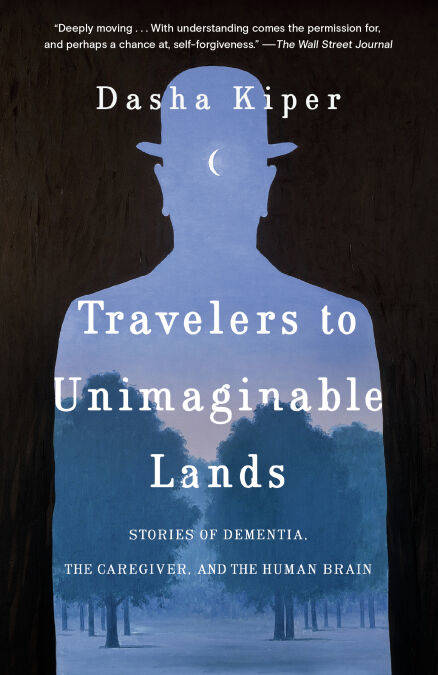
Je cadeautjes zeker op tijd in huis hebben voor de feestdagen? Kom langs in onze winkels en vind het perfecte geschenk!
- Afhalen na 1 uur in een winkel met voorraad
- Gratis thuislevering in België vanaf € 30
- Ruim aanbod met 7 miljoen producten
Je cadeautjes zeker op tijd in huis hebben voor de feestdagen? Kom langs in onze winkels en vind het perfecte geschenk!
- Afhalen na 1 uur in een winkel met voorraad
- Gratis thuislevering in België vanaf € 30
- Ruim aanbod met 7 miljoen producten
Zoeken
Travelers to Unimaginable Lands E-BOOK
Stories of Dementia, the Caregiver, and the Human Brain
Dasha Kiper
E-book | Engels
€ 5,77
+ 5 punten
Omschrijving
These “moving and often surprising” (The Wall Street Journal) case histories meld science and storytelling to show that caregivers don’t just witness cognitive decline in their loved ones with dementia—they are its invisible victims.
“This book will forever change the way we see people with dementia disorders—and the people who care for them.”—Lori Gottlieb, author of Maybe You Should Talk to Someone
A BBC BOOK OF THE WEEK • A TELEGRAPH BEST BOOK OF SUMMER • A NEW YORK TIMES BOOK REVIEW EDITORS’ CHOICE
Inspired by Dasha Kiper’s experience as a caregiver and counselor and informed by a breadth of cognitive and neurological research, Travelers to Unimaginable Lands dispels the myth of the perfect caregiver. In these compassionate, nonjudgmental stories of parents and children, husbands and wives, contending with dementia disorders, Kiper explores the existential dilemmas created by this disease: a man believes his wife is an impostor; a woman’s imaginary friendships with famous authors drive a wedge between her and her devoted husband; another woman’s childhood trauma emerges to torment her son; a man’s sudden, intense Catholic piety provokes his wife.
Kiper explains why the caregivers are maddened by these behaviors, mirroring their patients’ irrationality, even though they’ve been told it’s the disease at work. By demystifying the neurological obstacles to caregiving, Kiper illuminates the terrible pressure dementia disorders exert on our closest relationships, offering caregivers the perspective they need to be gentler with themselves.
“This book will forever change the way we see people with dementia disorders—and the people who care for them.”—Lori Gottlieb, author of Maybe You Should Talk to Someone
A BBC BOOK OF THE WEEK • A TELEGRAPH BEST BOOK OF SUMMER • A NEW YORK TIMES BOOK REVIEW EDITORS’ CHOICE
Inspired by Dasha Kiper’s experience as a caregiver and counselor and informed by a breadth of cognitive and neurological research, Travelers to Unimaginable Lands dispels the myth of the perfect caregiver. In these compassionate, nonjudgmental stories of parents and children, husbands and wives, contending with dementia disorders, Kiper explores the existential dilemmas created by this disease: a man believes his wife is an impostor; a woman’s imaginary friendships with famous authors drive a wedge between her and her devoted husband; another woman’s childhood trauma emerges to torment her son; a man’s sudden, intense Catholic piety provokes his wife.
Kiper explains why the caregivers are maddened by these behaviors, mirroring their patients’ irrationality, even though they’ve been told it’s the disease at work. By demystifying the neurological obstacles to caregiving, Kiper illuminates the terrible pressure dementia disorders exert on our closest relationships, offering caregivers the perspective they need to be gentler with themselves.
Specificaties
Betrokkenen
- Auteur(s):
- Uitgeverij:
Inhoud
- Aantal bladzijden:
- 288
- Taal:
- Engels
Eigenschappen
- Productcode (EAN):
- 9780399590542
- Verschijningsdatum:
- 6/03/2023
- Uitvoering:
- E-book
- Beveiligd met:
- Adobe DRM
- Formaat:
- ePub

Alleen bij Standaard Boekhandel
+ 5 punten op je klantenkaart van Standaard Boekhandel
Beoordelingen
We publiceren alleen reviews die voldoen aan de voorwaarden voor reviews. Bekijk onze voorwaarden voor reviews.









